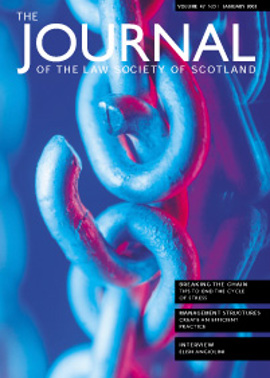Book reviews
The first edition of Sallinger provided a fine balance between practical knowledge and legal expertise but it was deficient in that there was no treatment of Scotland. This was remedied in the second edition which included a separate section by R Bruce Wood on factoring as it applies to Scotland. The Scottish section is along with the remainder of the book now updated to take account of recent developments.
Bruce Wood provides the only up-to-date statement of the law of intimation that the writer is aware of. He also deals with the importance of the Tay Valley Joinery decision as a means of carrying out confidential invoice discounting in Scotland. As is noted by Professor Roy Goode in his introduction, there has been a marked shift to this product in recent years. Further comfort is given to undisclosed invoice discounters in this edition in relation to the decisions given in Sharpe v Thomson and Style Financial Services v Bank of Scotland. There is also now a useful treatment of the rights of a factor against an arresting creditor. Notice is also taken of the L M Tenancies case in relation to stamp duty. The implications of the case are covered both in relation to Scotland and England.
Rather oddly the text appears to ignore the provisions of Section 11(3)(a) of the Requirements of Writing (Scotland) Act 1995 which abolishes any rule of law requiring writing for the assignation of incorporeal moveables. Perhaps the authors are simply recognising that in practical terms it would be extremely difficult to evidence an assignation without writing.
In the preface of the third edition it is noted that since the second edition was published a major development has been the greater use of electronic communication between the factor and client. It is disappointing that there is no discussion of the implications of this for factors acquiring title to debts. Perhaps this is not surprising given the more favourable English legal context arising from the doctrine of equitable assignment. In Scotland the implications of substituting electronic transfers for paper transactions will be considerable. It seems likely that there will require to be statutory intervention in this area of the law if Scottish businesses are not to be disadvantaged.
Finally in this context it is worth noting that Uncitral have for some time been considering assignments in relation to receivable financing although as Sallinger notes the process of consideration is still not completed. When it is it seems likely that a further edition of Sallinger’s book will be required and more importantly the Law Commission and the Scottish Parliament may then be prompted to bring Scots law into line with Uncitral recommendations.
Tony Deutsch
In this issue
- Scottish Solicitors’ Discipline Tribunal
- Dangerous link
- Creating effective management structures
- Effective cross selling
- Keeper’s corner
- Does the writ warrant a warrant?
- Interview: Elish Angiolini
- Website reviews
- Domain name disputes
- Explaining delays – managing expectations
- Exhaustion of trade marks
- Book reviews






